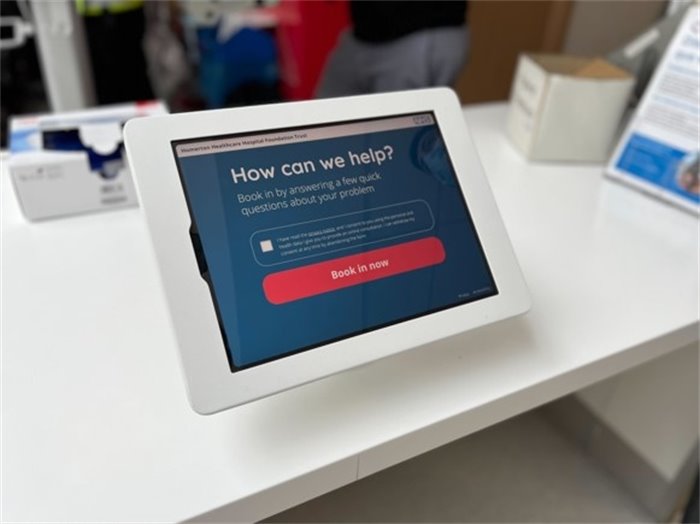The Health and Social Care Information Centre has successfully moved its NHS Spine in-house after an 18-month redevelopment project.
It said the transition and rebuild of Spine using open source software and managing it in-house had been completed without disruption.
NHS Spine stores around 150TB of data. This includes the details of 80 million people and 2.6 billion requests for information and associated amendments. The Spine, known as the “technological backbone of the NHS”, connects clinicians and patients to national services such as the Electronic Prescription Service, Summary Care Record and the e-Referral Service, which allow clinicians to deliver safe and effective care to patients.
Rob Shaw, HSCIC director of assurance services, said: “The usual practice for a big public sector project like this has been to give the whole thing to a large supplier. We decided that we could manage and make improvements to Spine more flexibly in-house, and have worked with a number of specialist SMEs to successfully deliver our aims.
“The NHS relies on the Spine in order to operate effectively, and we couldn’t afford for it to experience long periods of downtime. For this reason, we planned the transitions minute by minute to ensure that we would not affect patient care or inconvenience NHS workers any more than was absolutely necessary. In the end, we managed the entire transition with just minutes of downtime, none of which was unplanned.”
The new Spine, which is managed from HSCIC’s Leeds headquarters, is said to be the biggest public sector IT system built entirely using Open Source software. In has been claimed that in its first year the system saved the NHS £21m and the equivalent of 750 working days every day.
The first transition was completed in August 2014 when the Core Spine services were transferred to the HSCIC. In February 2015 the Care Identity Service, which manages secure access to IT services for NHS staff and the SUS database, which holds 80m patient demographic records, was moved. The project was completed on 31 January this year when MESH (Messaging Exchange for Social Care and Health) was launched and HSCIC took on responsibility for managing secure clinical messaging between Spine applications.




Mega Link Shop ( Visit https://archiver.fans )
Crii Baby RiRi OnlyFans Mega Link Download ( Visit https://archiver.fans )
Corinna Kopf OnlyFans Mega Link Download ( Visit https://archiver.fans )
Buy Only Fans Leaks ( Visit https://archiver.fans )
Mega Link Shop ( Visit https://archiver.fans )
Updated Only Fans Leaks ( Visit https://archiver.fans )
Rebecca J OnlyFans Mega Link Download ( Visit https://archiver.fans )
Its Lunar Liv OnlyFans Mega Link Download
Buy Leaked Only Fans ( Visit https://archiver.fans )
Mikaila Dancer OnlyFans Mega Link Download
Buy Leaked Only Fans ( Visit https://archiver.fans )
GG With The WAP OnlyFans Mega Link Download
Mulan Hernandez OnlyFans Mega Link Download ( Visit https://archiver.fans )
Mulan Hernandez OnlyFans Mega Link Download ( Visit https://archiver.fans )
Ima Cri Baby OnlyFans Mega Link Download ( Visit https://archiver.fans )
Genesis Mia Lopez OnlyFans Mega Link Download
Daalischus Rose OnlyFans Mega Link Download
Free Only Fans Leaks ( Visit https://archiver.fans )
Lexi 2 Legit OnlyFans Mega Link Download
10TB Only Fans Mega ( Visit https://archiver.fans )
Barely Legal Lexi OnlyFans Mega Link Download
Crii Baby RiRi OnlyFans Mega Link Download ( Visit https://archiver.fans )
Corinna Kopf OnlyFans Mega Link Download ( Visit https://archiver.fans )
Emmanuel Lustin OnlyFans Mega Link Download ( Visit https://archiver.fans )
Mikaila Dancer OnlyFans Mega Link Download
Its Lunar Liv OnlyFans Mega Link Download
Free Only Fans Leaks ( Visit https://archiver.fans )
Only Fans Leaks Free Download
Fansly Leaks Mega Link
Im xXx Dark OnlyFans Mega Link Download ( Visit https://archiver.fans )
Buy Mega Links ( Visit https://archiver.fans )
Leah Mifsud OnlyFans Mega Link Download ( Visit https://archiver.fans )
Mulan Hernandez OnlyFans Mega Link Download ( Visit https://archiver.fans )
Yasmine Lopez OnlyFans Mega Link Download ( Visit https://archiver.fans )
Barely Legal Lexi OnlyFans Mega Link Download
Bulma XO OnlyFans Mega Link Download
Mikaila Dancer OnlyFans Mega Link Download
Black Ass Jenny OnlyFans Mega Link Download
Rebecca J OnlyFans Mega Link Download ( Visit https://archiver.fans )
Buy Only Fans Leaks ( Visit https://archiver.fans )
Mulan Hernandez OnlyFans Mega Link Download ( Visit https://archiver.fans )
Rubi Rose OnlyFans Mega Link Download
North Natt OnlyFans Mega Link Download
8TB Only Fans Mega ( Visit https://archiver.fans )
10TB Only Fans Mega ( Visit https://archiver.fans )
Daalischus Rose OnlyFans Mega Link Download
Updated Only Fans Leaks ( Visit https://archiver.fans )
3TB Only Fans Mega
Mega Link Store
Free Only Fans Leaks ( Visit https://archiver.fans )
Mulan Hernandez OnlyFans Mega Link Download ( Visit https://archiver.fans )
Bulma XO OnlyFans Mega Link Download
Itz Grippy TV OnlyFans Mega Link Download ( Visit https://archiver.fans )
Buy Mega Links ( Visit https://archiver.fans )
GG With The WAP OnlyFans Mega Link Download
Jenise Hart OnlyFans Mega Link Download
Buy Leaked Content ( Visit https://archiver.fans )
Taylor Hall OnlyFans Mega Link Download
Im xXx Dark OnlyFans Mega Link Download ( Visit https://archiver.fans )
Emmanuel Lustin OnlyFans Mega Link Download ( Visit https://archiver.fans )
Only Fans Leaks Free Download
Leah Mifsud OnlyFans Mega Link Download ( Visit https://archiver.fans )
Buy Leaked Only Fans ( Visit https://archiver.fans )
Free Only Fans Leaks ( Visit https://archiver.fans )
Black Ass Jenny OnlyFans Mega Link Download
Buy Only Fans Leaks ( Visit https://archiver.fans )
8TB Only Fans Mega ( Visit https://archiver.fans )
TheRealRebeccaJ OnlyFans Mega Link Download
Rubi Rose OnlyFans Mega Link Download
8TB Only Fans Mega ( Visit https://archiver.fans )
Rubi Rose OnlyFans Mega Link Download
Buy Only Fans Leaks ( Visit https://archiver.fans )
Mulan Hernandez OnlyFans Mega Link Download ( Visit https://archiver.fans )
Taylor Hall OnlyFans Mega Link Download
Lexi 2 Legit OnlyFans Mega Link Download
Only Fans Leaks Mega Folders
Buy Leaked Only Fans ( Visit https://archiver.fans )
Mulan Hernandez OnlyFans Mega Link Download ( Visit https://archiver.fans )
Genesis Mia Lopez OnlyFans Mega Link Download
Hola Bulma OnlyFans Mega Link Download ( Visit https://archiver.fans )
Leah Mifsud OnlyFans Mega Link Download ( Visit https://archiver.fans )
Hot 4 Lexi OnlyFans Mega Link Download ( Visit https://archiver.fans )
Caaart OnlyFans Mega Link Download
10TB Only Fans Mega ( Visit https://archiver.fans )
Daalischus Rose OnlyFans Mega Link Download
Only Fans Leaks Updates
Emmanuel Lustin OnlyFans Mega Link Download ( Visit https://archiver.fans )
Itz Grippy TV OnlyFans Mega Link Download ( Visit https://archiver.fans )
Hola Bulma OnlyFans Mega Link Download ( Visit https://archiver.fans )
Genesis Mia Lopez OnlyFans Mega Link Download
Rebecca J OnlyFans Mega Link Download ( Visit https://archiver.fans )
Free Only Fans Leaks ( Visit https://archiver.fans )
Corinna Kopf OnlyFans Mega Link Download ( Visit https://archiver.fans )
Rubi Rose OnlyFans Mega Link Download
Hola Bulma OnlyFans Mega Link Download ( Visit https://archiver.fans )
Barely Legal Lexi OnlyFans Mega Link Download
Mulan Hernandez OnlyFans Mega Link Download ( Visit https://archiver.fans )
WavyTing OnlyFans Leaks Mega Folder Link Download ( https://UrbanCrocSpot.org )
The Real Bombshell Mint Only Fans Leaks ( https://UrbanCrocSpot.org/ )
GGWithDaWAP Only Fans Leaks https://urbancrocspot.org/tag/gg-with-the-wap/
SazonDePuertoRicoINC OnlyFans Leaks Mega Folder Link Download
GinaWAP Only Fans Leaks ( https://urbancrocspot.org/gina-wap-gg-with-the-wap-only-fans-mega-link-9gb/ )
BombshellMint ( https://UrbanCrocSpot.org/shop )
Tytiania Sargent OnlyFans Leaks ( https://urbancrocspot.org/the-real-bombshell-mint-only-fans-mega-link/ )
MiaaDiorr OnlyFans Leaks Mega Folder Link Download ( https://UrbanCrocSpot.org )
GinaWAP Mega Folder Link https://urbancrocspot.org/product-tag/gg-with-the-wap/
GGWithTheWAP Leaks ( https://urbancrocspot.org/gina-wap-gg-with-the-wap-only-fans-mega-link-9gb/ )
Bombshell Mint OnlyFans Leaks ( https://urbancrocspot.org/the-real-bombshell-mint-only-fans-mega-link/ )
Mexican Easy Pharm: Mexican Easy Pharm – mexican rx online
https://taya365.art/# Some casinos have luxurious spa facilities.
The poker community is very active here.
Loyalty programs reward regular customers generously.: phmacao com – phmacao com
Entertainment shows are common in casinos.: phmacao com – phmacao com
Gambling regulations are strictly enforced in casinos.: taya777 register login – taya777 app
http://taya365.art/# The ambiance is designed to excite players.
Promotions are advertised through social media channels.
Gambling can be a social activity here.: phtaya login – phtaya
La ruleta es un juego emocionante aquГ.: win chile – winchile casino
Responsible gaming initiatives are promoted actively.: phtaya – phtaya
Players can enjoy high-stakes betting options.: phmacao casino – phmacao club
The Philippines has a vibrant nightlife scene.: taya365 – taya365
https://winchile.pro/# Las apuestas mГnimas son accesibles para todos.
Poker rooms host exciting tournaments regularly.
Loyalty programs reward regular customers generously.: taya777.icu – taya777
http://taya365.art/# Slot tournaments create friendly competitions among players.
Players must be at least 21 years old.
The ambiance is designed to excite players.: taya365 com login – taya365
https://jugabet.xyz/# Los juegos en vivo ofrecen emociГіn adicional.
The Philippines offers a rich gaming culture.
taya365 login taya365 com login Players can enjoy high-stakes betting options.
Los jackpots progresivos atraen a los jugadores.: jugabet – jugabet.xyz
http://winchile.pro/# Los jugadores deben jugar con responsabilidad.
Many casinos offer luxurious amenities and services.
Las promociones atraen nuevos jugadores diariamente.: jugabet – jugabet.xyz
Some casinos have luxurious spa facilities.: taya777 – taya777.icu
http://taya365.art/# Promotions are advertised through social media channels.
Many casinos have beautiful ocean views.
taya365 login taya365 com login Players can enjoy high-stakes betting options.
The Philippines has several world-class integrated resorts.: phtaya – phtaya login
http://phmacao.life/# The thrill of winning keeps players engaged.
The Philippines has a vibrant nightlife scene.
п»їLos casinos en Chile son muy populares.: winchile.pro – winchile
Some casinos feature themed gaming areas.: phtaya login – phtaya login
https://phtaya.tech/# Gambling can be a social activity here.
Players enjoy a variety of table games.
Los torneos de poker generan gran interГ©s.: jugabet casino – jugabet chile
Live dealer games enhance the casino experience.: phtaya – phtaya casino
https://taya777.icu/# Players enjoy both fun and excitement in casinos.
The poker community is very active here.
Visitors come from around the world to play. https://phtaya.tech/# Slot tournaments create friendly competitions among players.
https://taya777.icu/# Gambling regulations are strictly enforced in casinos.
Casino visits are a popular tourist attraction.
https://doxbin.org/upload/JayceBradfordChildPredatorCPConnoisseur
https://jugabet.xyz/# Las aplicaciones mГіviles permiten jugar en cualquier lugar.
Gambling regulations are strictly enforced in casinos.
Gambling regulations are strictly enforced in casinos.: taya777 – taya777 login
http://taya777.icu/# High rollers receive exclusive treatment and bonuses.
Players enjoy a variety of table games.
Los juegos de mesa son clГЎsicos eternos.: winchile casino – winchile
http://phmacao.life/# Casino promotions draw in new players frequently.
Promotions are advertised through social media channels.
Entertainment shows are common in casinos.: taya777 – taya777.icu
http://taya777.icu/# Casinos offer delicious dining options on-site.
Gaming regulations are overseen by PAGCOR.
online pharmacy india: MegaIndiaPharm – top 10 online pharmacy in india
canadian pharmacy ed medications: easy canadian pharm – easy canadian pharm
canadian pharmacy no prescription https://discountdrugmart.pro/# online pharmacy no prescription needed
Mega India Pharm: Mega India Pharm – MegaIndiaPharm
Mega India Pharm: MegaIndiaPharm – Mega India Pharm
cheapest pharmacy to fill prescriptions without insurance https://xxlmexicanpharm.com/# xxl mexican pharm
indian pharmacies safe: MegaIndiaPharm – MegaIndiaPharm
reputable indian pharmacies best online pharmacy india MegaIndiaPharm
online pharmacy discount code http://familypharmacy.company/# online pharmacy delivery usa
MegaIndiaPharm: mail order pharmacy india – MegaIndiaPharm
Best online pharmacy Online pharmacy USA family pharmacy
canadian pharmacy discount coupon https://easycanadianpharm.com/# easy canadian pharm
cheapest pharmacy to get prescriptions filled https://easycanadianpharm.com/# global pharmacy canada
easy canadian pharm: easy canadian pharm – easy canadian pharm
xxl mexican pharm: mexican pharmaceuticals online – reputable mexican pharmacies online
cheapest pharmacy to fill prescriptions with insurance http://discountdrugmart.pro/# non prescription medicine pharmacy
pharmacies in mexico that ship to usa: xxl mexican pharm – xxl mexican pharm
xxl mexican pharm: xxl mexican pharm – medication from mexico pharmacy
pharmacy without prescription http://xxlmexicanpharm.com/# xxl mexican pharm
mexican online pharmacies prescription drugs: xxl mexican pharm – xxl mexican pharm